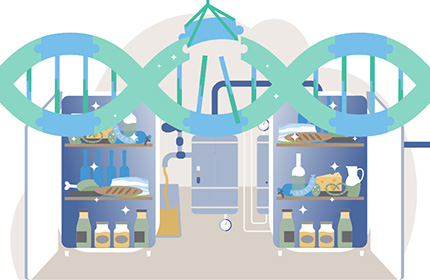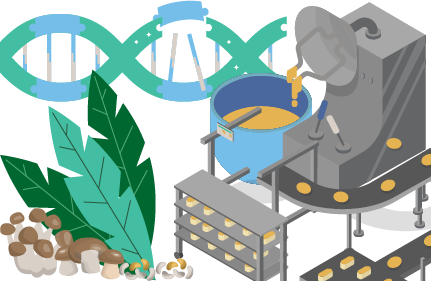Workshop on Microbial Biotechnology for Food, Feed, and Agricultural Use in South America
-
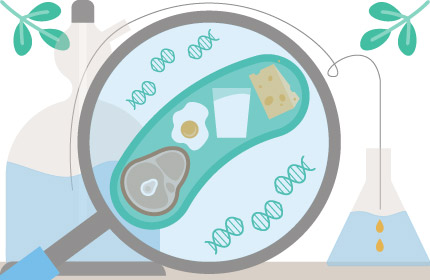
June 5, 2024-June 6, 2024
10:00 am - 12:30 pmVirtual (UTC-3)
Buenos Aires, Argentina
The Agriculture and Food Systems Institute (AFSI) has been organizing outreach events on microbial biotechnology since 2020, beginning with a general webinar series for a global audience. This was followed by virtual workshops for stakeholders in the European Union, India, and Southeast Asia. On June 5-6, 2024, AFSI and the Secretariat of Bioeconomy, Ministry of Economy of Argentina co-hosted a two-day virtual workshop on microbial biotechnology to discuss the current technology and future opportunities for the use of genetically engineered and genome edited microbes and their derived products for use in food, feed, and agriculture in South America.
The workshop included presentations and panel sessions to discuss the changing landscape of products of microbial biotechnology in South America, their regulation, and the role of international organizations in supporting the safety assessment of these products. Simultaneously translated into Spanish, the webinar featured talks on regulatory frameworks for genetically engineered microbes in several countries in the region.
Microbial Biotechnology
Microbial biotechnology includes applications in the field of agriculture, the production of food, and ingredients used in food and feed. In the food industry, it is used to produce a range of foods, beverages, and their ingredients, including:
- enzymes employed for making wine, cheese, beer, and processed products
- vitamins and amino acids
- human milk oligosaccharides for infant food products
- purified flavors, colors, and other food components.
In recent years, the applications of microorganisms in improving animal feed has tremendously benefitted livestock agriculture by:
- adding value ingredients to the forage
- enhancing the bioavailability of nutrients through the use of enzymes
- manipulating rumen microbes to improve animal health.
Microorganisms are a vital component of sustainable agriculture, with genetically engineered and genome edited strains being used to protect soil health, improve soil fertility, reduce dependence on synthetic fertilizers, enhance stress tolerance, and protect against diseases.

Agenda
Day 1: State of the Science, Research, and Development
June 5, 2024 | 10:00 am - 12:00 pm (UTC-3)
| Time | Presentation/Activity | Speaker/Panelists | |
| 10:00 am | Welcome and Introduction to the Program | Dr. Bhavneet Bajaj Manager–Scientific Programs, Agriculture & Food Systems Institute,USA |
|
| 10:05 am | Opening Remarks |
Mr. Pablo Nardone Undersecretary of Food, Bioeconomy and Regional Development, Secretariat of Agriculture, Fisheries, and Livestock, Ministry of Economy, Argentina |
|
| 10:15 am | History and Use of Fermented Foods in South America: Linkage with Culture, Sustainability, and Innovative Technologies | Dr. Gabriel Vinderola Associate Professor of Microbiology, Faculty of Chemical Engineering, National University of the Littoral & Principal Researcher, National Council for Scientific and , Technical Research (CONICET), Argentina |
|
| 10:30 am | History and Use of Microorganisms for Agricultural and Ecological Use in South America | Dr. Sandra Ruzal Independent Researcher, National Council for Scientific and Technical Research (CONICET) & Institute of Biological Chemistry, Faculty of Exact and Natural Sciences, University of Buenos Aires, Argentina |
|
| 10:45 am | The Changing Landscape of Products Derived from Microbial Biotechnology | Dr. Vincent Sewalt Head of Scientific and Public Affairs, International Flavors and Fragrances, USA |
|
| Ms. Shade Sabitu Director, Regulatory Science and Operations, Pivot Bio, USA |
|||
| Mr. Fábio Itami Senior Partner – HMOs Global Regulatory, Novonesis, Denmark |
|||
| 11:30 am | Panel Discussion: Microbial Biotechnology Products in South America | Dr. Carmen Vicien (moderator) Professor, Faculty of Agronomy, University of Buenos Aires, Argentina |
|
| Panelists: | |||
| Dr. Marcos Puppin Director of Regulatory and Scientific Affairs, Brazilian Bioinnovation Association (ABBI), Brazil |
|||
| Dr. Enrique Detarsio New Specialties Development Manager, The Chamber of the Argentine Fertilizer and Agrochemical Industry (Nova-CIAFA), Argentina |
|||
| Ms. Cristiana Barbosa da Silva Senior Regulatory Affairs Specialist for LATAM, Novozymes and Chamber of Agricultural Health and Fertilizers (CASAFE), Argentina |
|||
| All earlier speakers | |||
| 11:55 | Overview of Day 2 & Concluding Remarks | Dr. Bhavneet Bajaj |
Day 2: Regulation of Microbial Biotechnology in South America
June 6, 2024 | 10:00 am - 12:00 pm (UTC-3)
| Time | Presentation/Activity | Speaker/Panelists | |
| 10:00 am | Welcome and Recap of Day 1 | Dr. Bhavneet Bajaj | |
| 10:05 am | Safety Assessment of Products Derived from Microbial Biotechnology: The Role of International Organizations – Codex and OECD |
Agr. Eng. Andrés I. Maggi General Coordinator, Directorate of Strategy and Risk Analysis, National Agrifood Health and Quality Service (SENASA), Argentina |
|
| 10:20 am | Country Presentations: Regulatory Framework for Products of Microbial Biotechnology (Food/Feed and/or Environment) | Ms. Perla Godoy Innovation of Biotechnology Coordinator, Secretariat of Bioeconomy, Ministry of Economy, Argentina |
|
| Dr. Danilo Fernández Ríos Professor, National University of Asunción, Paraguay |
|||
| Dr. Gutemberg Sousa Science and Technology Analyst, CTNBio and Ministry of Science, Technology, and Innovation, Brazil |
|||
| 11:05 am | Panel Discussion: Regulatory Policy Outlook in the Microbial Biotechnology Space in South America | Prof. Carmen Vicien (moderator) Faculty of Agronomy, University of Buenos Aires, Argentina |
|
| Panelists: | |||
| Mr. Facundo Simeone Technical Specialist, Secretariat of Bioeconomy, Ministry of Economy, Argentina |
|||
| Dr. Germán Ceizel Borella Regulatory Affairs Specialist – Agriculture, Secretariat of Bioeconomy, Ministry of Economy, Argentina |
|||
| All earlier speakers | |||
| 11:50 am | Concluding Remarks | Dr. Daniel A. Kovich Science Advisor, United States Department of Agriculture (USDA) Foreign Agricultural Service (FAS), USA |
Speakers
Mr. Pablo Nardone
Undersecretary of Food, Bioeconomy and Regional Development, Secretariat of Agriculture, Fisheries, and Livestock, Ministry of Economy, Argentina
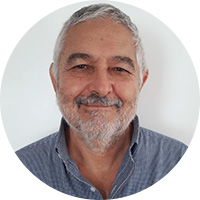 Pablo Nardone is the Undersecretary of Food, Bioeconomy and Regional Development at the Secretariat of Agriculture, Fisheries, and Livestock, Ministry of Economy, Argentina. Before this, he was the Bioeconomy Advisor at the Ministry of Science, Technology, and Innovation. A biochemist by training, he graduated from the University of Buenos Aires, where he specialized in Biotechnology and Industrial Microbiology. Since 2012, Pablo has served as a bioeconomy advisor, coordinating various events and working groups. He has authored virtual courses on bioeconomy in collaboration with IICA, the University of Buenos Aires, and INTA. Additionally, he is an active member of the National Advisory Commission on Biomaterials in Argentina. Since 2017, Pablo has been the Director of the Virtual Program “Introduction to the Argentine Bioeconomy,” a collaborative effort involving the Ministries of Science and Technology, Agriculture, Livestock and Fisheries, and the Buenos Aires Cereal Exchange.
Pablo Nardone is the Undersecretary of Food, Bioeconomy and Regional Development at the Secretariat of Agriculture, Fisheries, and Livestock, Ministry of Economy, Argentina. Before this, he was the Bioeconomy Advisor at the Ministry of Science, Technology, and Innovation. A biochemist by training, he graduated from the University of Buenos Aires, where he specialized in Biotechnology and Industrial Microbiology. Since 2012, Pablo has served as a bioeconomy advisor, coordinating various events and working groups. He has authored virtual courses on bioeconomy in collaboration with IICA, the University of Buenos Aires, and INTA. Additionally, he is an active member of the National Advisory Commission on Biomaterials in Argentina. Since 2017, Pablo has been the Director of the Virtual Program “Introduction to the Argentine Bioeconomy,” a collaborative effort involving the Ministries of Science and Technology, Agriculture, Livestock and Fisheries, and the Buenos Aires Cereal Exchange.
Dr. Gabriel Vinderola
Associate Professor of Microbiology, Faculty of Chemical Engineering, National University of the Littoral & Principal Researcher, National Council for Scientific and, Technical Research (CONICET), Argentina
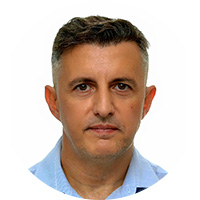 Dr. Gabriel Vinderola serves as an Associate Professor of Microbiology at the Faculty of Chemical Engineering, National University of the Litoral, and as a Principal Researcher at the National Council for Scientific and Technical Research (CONICET) in Argentina. Since 1995, he has been dedicated to researching lactic acid bacteria, probiotics, prebiotics, postbiotics, fermented foods, and microbiota. In 2020, Dr. Vinderola joined the board of directors of the International Scientific Association of Probiotics and Prebiotics (ISAPP), underscoring his role as a key influencer in his field. He has authored over 120 scientific articles and book chapters, contributing substantially to the literature on microbiological sciences. Dr. Vinderola is also the editor of Lactic Acid Bacteria: Microbiological and Functional Aspects, now preparing its sixth edition for 2024. Committed to public engagement, he actively communicates the complexities of science through his Instagram platform (@gvinde), making the science of microbiology accessible to a wider audience.
Dr. Gabriel Vinderola serves as an Associate Professor of Microbiology at the Faculty of Chemical Engineering, National University of the Litoral, and as a Principal Researcher at the National Council for Scientific and Technical Research (CONICET) in Argentina. Since 1995, he has been dedicated to researching lactic acid bacteria, probiotics, prebiotics, postbiotics, fermented foods, and microbiota. In 2020, Dr. Vinderola joined the board of directors of the International Scientific Association of Probiotics and Prebiotics (ISAPP), underscoring his role as a key influencer in his field. He has authored over 120 scientific articles and book chapters, contributing substantially to the literature on microbiological sciences. Dr. Vinderola is also the editor of Lactic Acid Bacteria: Microbiological and Functional Aspects, now preparing its sixth edition for 2024. Committed to public engagement, he actively communicates the complexities of science through his Instagram platform (@gvinde), making the science of microbiology accessible to a wider audience.
Dr. Sandra Ruzal
Independent Researcher, National Council for Scientific and Technical Research (CONICET) & Institute of Biological Chemistry, Faculty of Exact and Natural Sciences, University of Buenos Aires, Argentina
 Dr. Sandra Ruzal is currently serving as an Independent Researcher at the National Council for Scientific and Technical Research (CONICET) and the Institute of Biological Chemistry, Faculty of Exact and Natural Sciences, University of Buenos Aires, Argentina. She earned her undergraduate degree in Biological Sciences in 1987 and her Ph.D. in Biological Sciences from the University of Buenos Aires in 1994, focusing on the osmotic stress response of Bacillus subtilis. Dr. Ruzal has had a distinguished career in academia, transitioning from an Assistant Teacher (1987-2007) to an Adjunct Professor in the Department of Biological Chemistry at the same university until 2023. Her research expertise lies in microbiology, physiology, and genetics of Gram-positive bacteria. Over her career, Dr. Ruzal has directed numerous doctoral, master’s, and bachelor’s theses, contributing significantly to the development of human resources in her field. Her scholarly output includes various publications in international journals, books, and book chapters, showcasing her contributions to the scientific community. Her publication record can be accessed via her ORCID profile at https://orcid.org/0000-0001-6388-7567.
Dr. Sandra Ruzal is currently serving as an Independent Researcher at the National Council for Scientific and Technical Research (CONICET) and the Institute of Biological Chemistry, Faculty of Exact and Natural Sciences, University of Buenos Aires, Argentina. She earned her undergraduate degree in Biological Sciences in 1987 and her Ph.D. in Biological Sciences from the University of Buenos Aires in 1994, focusing on the osmotic stress response of Bacillus subtilis. Dr. Ruzal has had a distinguished career in academia, transitioning from an Assistant Teacher (1987-2007) to an Adjunct Professor in the Department of Biological Chemistry at the same university until 2023. Her research expertise lies in microbiology, physiology, and genetics of Gram-positive bacteria. Over her career, Dr. Ruzal has directed numerous doctoral, master’s, and bachelor’s theses, contributing significantly to the development of human resources in her field. Her scholarly output includes various publications in international journals, books, and book chapters, showcasing her contributions to the scientific community. Her publication record can be accessed via her ORCID profile at https://orcid.org/0000-0001-6388-7567.
Dr. Vincent Sewalt
Head of Scientific and Public Affairs, International Flavors and Fragrances, USA
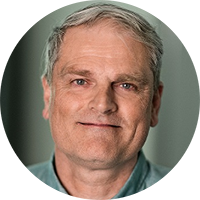 Dr. Vincent Sewalt leads the Scientific & Public Affairs function of IFF, a business that develops nutritional and bioscience products aimed at improving the sustainability of the food chain and the bio-based economy at large. Vince has an Ir. degree from Wageningen Agricultural University in the Netherlands, a Ph.D. in Nutrition from Virginia Tech in the US, and was a biotech post-doc with Agriculture & Agri-Foods Canada and with the Noble Foundation in Oklahoma, US. His early career research publications and patents made Dr. Sewalt a recognized expert in plant cell wall chemistry, plant lignin biosynthesis, maize seed physiology, and genetic manipulation interventions to enhance the conversion of both grain and biomass for animal nutrition and biofuels.
Dr. Vincent Sewalt leads the Scientific & Public Affairs function of IFF, a business that develops nutritional and bioscience products aimed at improving the sustainability of the food chain and the bio-based economy at large. Vince has an Ir. degree from Wageningen Agricultural University in the Netherlands, a Ph.D. in Nutrition from Virginia Tech in the US, and was a biotech post-doc with Agriculture & Agri-Foods Canada and with the Noble Foundation in Oklahoma, US. His early career research publications and patents made Dr. Sewalt a recognized expert in plant cell wall chemistry, plant lignin biosynthesis, maize seed physiology, and genetic manipulation interventions to enhance the conversion of both grain and biomass for animal nutrition and biofuels.
With over 25 years’ experience managing innovation and market access of agricultural & bioscience products in four US companies, Vince is passionate about biotech capacity building with regulators and other stakeholders. Vince has shared his insights on microbial biotech risk assessment and risk communication at multiple conferences globally and with regulatory agencies in Latin America and elsewhere. Vince is a prolific author with over thirty peer-reviewed publications and patents in the areas of food & agricultural science, biotechnology, and safety/regulation of microbial products (for example, “GEMs and their regulatory oversight” https://doi.org/10.1080/10408398.2020.1749026). Vince has served as a reviewer of scientific publications, as associate editor of the journal Industrial Biotechnology, and as a board member of multiple trade associations and NGOs.
Ms. Shade Sabitu
Director, Regulatory Science and Operations, Pivot Bio, USA
 Shade Sabitu has spent the last 16 years ensuring innovative and sustainable products get into the hands of farmers around the world by working with regulators and other stakeholders to get agricultural biotech products approved for field trials and commercial distribution. For the past 6 years, she has been with Pivot Bio where she leads a team responsible for ensuring the safety of its products, while enabling its freedom to operate in countries of interest at state and federal levels. She also represents Pivot Bio at various trade associations, including BPIA and BIO. Her previous experience includes regulatory roles at companies like Corteva and Indigo Ag. Her background is in Molecular Biology and Business Administration, and she constantly looks for ways to grow and share knowledge with others. She is always happy to have the opportunity to share the great things that Pivot Bio is working on.
Shade Sabitu has spent the last 16 years ensuring innovative and sustainable products get into the hands of farmers around the world by working with regulators and other stakeholders to get agricultural biotech products approved for field trials and commercial distribution. For the past 6 years, she has been with Pivot Bio where she leads a team responsible for ensuring the safety of its products, while enabling its freedom to operate in countries of interest at state and federal levels. She also represents Pivot Bio at various trade associations, including BPIA and BIO. Her previous experience includes regulatory roles at companies like Corteva and Indigo Ag. Her background is in Molecular Biology and Business Administration, and she constantly looks for ways to grow and share knowledge with others. She is always happy to have the opportunity to share the great things that Pivot Bio is working on.
Mr. Fábio Itami
Senior Partner – HMOs Global Regulatory, Novonesis, Denmark
 Fábio Marques Itami is a regulatory professional at Novonesis, a global company leading the era of biosolutions. By leveraging the power of microbiology with science, it seeks to transform the way the world produces, consumes, and lives. Active in more than 30 industries, with 10,000 people worldwide working closely with our partners and customers to transform business with biology, its biosolutions are already creating value for thousands of customers and benefiting the planet.
Fábio Marques Itami is a regulatory professional at Novonesis, a global company leading the era of biosolutions. By leveraging the power of microbiology with science, it seeks to transform the way the world produces, consumes, and lives. Active in more than 30 industries, with 10,000 people worldwide working closely with our partners and customers to transform business with biology, its biosolutions are already creating value for thousands of customers and benefiting the planet.
An HMOs Global Regulatory Senior Partner at Novonesis, Fábio provides regulatory guidance and strategic direction to maintain and expand the market access for the HMO portfolio of the company. Fábio has considerable experience handling regulatory matters in Latin America and other parts of the world, such as Asia/Pacific and North America. For more than a decade, he headed a LATAM regulatory team supporting all business divisions and dealing with regulatory bodies across the Latin America region in the food, feed, and plant segments.
Dr. Carmen Vicien
Professor, Faculty of Agronomy, University of Buenos Aires, Argentina
 Dr. Carmen Vicien is a Professor at the Faculty of Agronomy, University of Buenos Aires, Argentina. She earned her Agricultural Science degree from the University of Buenos Aires and pursued post-graduate studies in France at the IAMM, Montpellier, and the University of Paris I (Panthéon-Sorbonne). Dr. Vicien’s expertise spans the Economics of Agricultural Production and Innovation, Environmental Risk Analysis, and Regulatory Policies for Biotechnology in agriculture. She currently serves as Co-Director of the graduate certificate on risk analysis for the agri-food sector and Director of the graduate specialization in formulation and evaluation of agricultural and agro-industrial projects at her university, where she holds a full Professorship. She has coordinated and participated as an expert in various research and development projects funded by entities, including the University of Buenos Aires, the National Agency for Scientific and Technological Promotion of Argentina, the European Commission, and FAO. She has published numerous scientific papers and technical articles, as well as edited several books. Dr. Vicien has also delivered lectures for courses organized by international and regional organizations such as FAO, ICGEB, UNEP, CLI, AFSI, and ICCAS. Previously, she was the Technical Chair for the National Advisory Commission on Agricultural Biotechnology (CONABIA) in Argentina and participated in the Argentine delegation negotiating the Cartagena Protocol on Biosafety. She is the Vice-President of the Institute for Scientific Cooperation on Environment and Health (ICCAS) in Buenos Aires and President of the Foundation on Applied Biological Research (FIBA) in Mar del Plata, Buenos Aires, Argentina.
Dr. Carmen Vicien is a Professor at the Faculty of Agronomy, University of Buenos Aires, Argentina. She earned her Agricultural Science degree from the University of Buenos Aires and pursued post-graduate studies in France at the IAMM, Montpellier, and the University of Paris I (Panthéon-Sorbonne). Dr. Vicien’s expertise spans the Economics of Agricultural Production and Innovation, Environmental Risk Analysis, and Regulatory Policies for Biotechnology in agriculture. She currently serves as Co-Director of the graduate certificate on risk analysis for the agri-food sector and Director of the graduate specialization in formulation and evaluation of agricultural and agro-industrial projects at her university, where she holds a full Professorship. She has coordinated and participated as an expert in various research and development projects funded by entities, including the University of Buenos Aires, the National Agency for Scientific and Technological Promotion of Argentina, the European Commission, and FAO. She has published numerous scientific papers and technical articles, as well as edited several books. Dr. Vicien has also delivered lectures for courses organized by international and regional organizations such as FAO, ICGEB, UNEP, CLI, AFSI, and ICCAS. Previously, she was the Technical Chair for the National Advisory Commission on Agricultural Biotechnology (CONABIA) in Argentina and participated in the Argentine delegation negotiating the Cartagena Protocol on Biosafety. She is the Vice-President of the Institute for Scientific Cooperation on Environment and Health (ICCAS) in Buenos Aires and President of the Foundation on Applied Biological Research (FIBA) in Mar del Plata, Buenos Aires, Argentina.
Dr. Marcos Puppin
Director of Regulatory and Scientific Affairs, Brazilian Bioinnovation Association (ABBI), Brazil
 Dr. Marcos Puppin serves as the Director of Regulatory and Scientific Affairs at the Brazilian Bioinnovation Association (ABBI), Brazil. He earned his B.S. in Chemistry and his M.S. and Ph.D. in Food Science from the State University of Campinas (UNICAMP), with part of his doctoral research conducted at the Central Science Laboratory in England. Additionally, he holds an MBA in Government Relations from FGV. His academic career includes over a decade of research at UNICAMP. Subsequently, he brought his expertise to Nestlé, where he led the Regulatory and Scientific Affairs department for over 22 years. His extensive experience in both academic and corporate settings underpins his leadership in navigating the complexities of bioinnovation regulatory frameworks.
Dr. Marcos Puppin serves as the Director of Regulatory and Scientific Affairs at the Brazilian Bioinnovation Association (ABBI), Brazil. He earned his B.S. in Chemistry and his M.S. and Ph.D. in Food Science from the State University of Campinas (UNICAMP), with part of his doctoral research conducted at the Central Science Laboratory in England. Additionally, he holds an MBA in Government Relations from FGV. His academic career includes over a decade of research at UNICAMP. Subsequently, he brought his expertise to Nestlé, where he led the Regulatory and Scientific Affairs department for over 22 years. His extensive experience in both academic and corporate settings underpins his leadership in navigating the complexities of bioinnovation regulatory frameworks.
Dr. Enrique Detarsio
New Specialties Development Manager, The Chamber of the Argentine Fertilizer and Agrochemical Industry (Nova-CIAFA), Argentina
 Dr. Enrique Detarsio is the New Specialties Development Manager at Nova, overseeing the Enzyme Research and Development division. He holds a B.S. in Biotechnology and a Ph.D. in Biological Sciences from the National University of Rosario. Additionally, he has completed a specialization in bioindustries at the Japan Bioindustries Association. Dr. Detarsio founded a laboratory specializing in the molecular diagnosis of hematological diseases and has contributed to research in plant physiology, molecular biology, and protein engineering at various prestigious research centers. His extensive experience also includes several years in the biotechnology patents sector, where he is recognized as an Industrial Property Agent. His diverse expertise and leadership in biotechnology development have significantly advanced the field.
Dr. Enrique Detarsio is the New Specialties Development Manager at Nova, overseeing the Enzyme Research and Development division. He holds a B.S. in Biotechnology and a Ph.D. in Biological Sciences from the National University of Rosario. Additionally, he has completed a specialization in bioindustries at the Japan Bioindustries Association. Dr. Detarsio founded a laboratory specializing in the molecular diagnosis of hematological diseases and has contributed to research in plant physiology, molecular biology, and protein engineering at various prestigious research centers. His extensive experience also includes several years in the biotechnology patents sector, where he is recognized as an Industrial Property Agent. His diverse expertise and leadership in biotechnology development have significantly advanced the field.
Ms. Cristiana Barbosa da Silva
Senior Regulatory Affairs Specialist for LATAM, Novozymes and Chamber of Agricultural Health and Fertilizers (CASAFE), Argentina
 Ms. Cristiana Barbosa da Silva currently serves as a Senior Regulatory Affairs Specialist for Latin America at Novozymes and is associated with the Chamber of Agricultural Health and Fertilizers (CASAFE), Argentina. She holds a degree in Pharmacy and a Master of Science from the Federal University of Ceará, Brazil, as well as a Postgraduate Degree in Regulatory Affairs for the Pharmaceutical Industry from the University of Buenos Aires, Argentina. Over the past 15 years, she has led regulatory affairs across Latin America for multinational corporations in the pharmaceutical, clinical research, agriculture, and biotechnology sectors. She has been instrumental through her work with CASAFE in influencing the publication of the new Bioinputs Resolution by SENASA. Currently, she is engaged in developing new standards with the Argentine Institute of Standardization and Certification (IRAM).
Ms. Cristiana Barbosa da Silva currently serves as a Senior Regulatory Affairs Specialist for Latin America at Novozymes and is associated with the Chamber of Agricultural Health and Fertilizers (CASAFE), Argentina. She holds a degree in Pharmacy and a Master of Science from the Federal University of Ceará, Brazil, as well as a Postgraduate Degree in Regulatory Affairs for the Pharmaceutical Industry from the University of Buenos Aires, Argentina. Over the past 15 years, she has led regulatory affairs across Latin America for multinational corporations in the pharmaceutical, clinical research, agriculture, and biotechnology sectors. She has been instrumental through her work with CASAFE in influencing the publication of the new Bioinputs Resolution by SENASA. Currently, she is engaged in developing new standards with the Argentine Institute of Standardization and Certification (IRAM).
Agr. Eng. Andrés I. Maggi
General Coordinator, Directorate of Strategy and Risk Analysis, National Agrifood Health and Quality Service (SENASA), Argentina
 Agr. Eng. Andrés I. Maggi serves as the General Coordinator of Biotechnology within the Directorate of Strategy and Risk Analysis at the National Agrifood Health and Quality Service (SENASA), Argentina. He graduated as an Agricultural Engineer from the National University of Lomas de Zamora (UNLZ) in Buenos Aires. Since joining SENASA in 2005, he has played a pivotal role in regulating genetically modified organisms (GMOs). His responsibilities include assessing the safety of food and feed derived from GMOs, establishing import and export conditions for GMOs, certifying GMO products for export, and developing control protocols for specific markets. Additionally, He is actively involved in negotiating biotechnology-related issues in international forums. Since 2020, he has also been a representative member of SENASA at the National Advisory Commission on Agricultural Biotechnology (CONABIA).
Agr. Eng. Andrés I. Maggi serves as the General Coordinator of Biotechnology within the Directorate of Strategy and Risk Analysis at the National Agrifood Health and Quality Service (SENASA), Argentina. He graduated as an Agricultural Engineer from the National University of Lomas de Zamora (UNLZ) in Buenos Aires. Since joining SENASA in 2005, he has played a pivotal role in regulating genetically modified organisms (GMOs). His responsibilities include assessing the safety of food and feed derived from GMOs, establishing import and export conditions for GMOs, certifying GMO products for export, and developing control protocols for specific markets. Additionally, He is actively involved in negotiating biotechnology-related issues in international forums. Since 2020, he has also been a representative member of SENASA at the National Advisory Commission on Agricultural Biotechnology (CONABIA).
Ms. Perla Godoy
Innovation of Biotechnology Coordinator, Secretariat of Bioeconomy, Ministry of Economy, Argentina
 Ms. Perla Godoy is the Coordinator of Innovation in Biotechnology at the Secretariat of Bioeconomy, Ministry of Economy, Argentina. Holding a degree in Agronomic Engineering, she currently oversees regulatory issues for products derived from modern biotechnology, including genetically modified organisms and products derived from new breeding techniques (NBT), as well as bioinputs. From 2021 to 2023, she served as the Coordinator of Innovation and Biotechnology and the Executive Secretary of the National Advisory Committee on Agricultural Biotechnology (CONABIA), the National Advisory Committee on Biomaterials (COBIOMAT), and the Advisory Committee on Bioinputs for Agricultural Use (CABUA). Previously, from 2009 to 2012, she was the Director of Biotechnology and Executive Secretary of CONABIA. She has contributed to several important publications, including works on genomic editing and updates on Argentina’s regulatory policies on the environmental risk assessment of biotechnological products.
Ms. Perla Godoy is the Coordinator of Innovation in Biotechnology at the Secretariat of Bioeconomy, Ministry of Economy, Argentina. Holding a degree in Agronomic Engineering, she currently oversees regulatory issues for products derived from modern biotechnology, including genetically modified organisms and products derived from new breeding techniques (NBT), as well as bioinputs. From 2021 to 2023, she served as the Coordinator of Innovation and Biotechnology and the Executive Secretary of the National Advisory Committee on Agricultural Biotechnology (CONABIA), the National Advisory Committee on Biomaterials (COBIOMAT), and the Advisory Committee on Bioinputs for Agricultural Use (CABUA). Previously, from 2009 to 2012, she was the Director of Biotechnology and Executive Secretary of CONABIA. She has contributed to several important publications, including works on genomic editing and updates on Argentina’s regulatory policies on the environmental risk assessment of biotechnological products.
Dr. Danilo Fernández Ríos
Professor, National University of Asunción, Paraguay
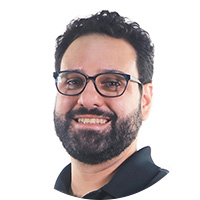 Dr. Danilo Fernández Ríos serves as a Professor at the National University of Asunción (UNA), Paraguay, where he specializes in molecular cell biology, genetics, and biosafety in biotechnology. He holds a bachelor’s degree in Science (Biology) from UNA and further advanced his expertise with postgraduate studies in biological sciences, specializing in genetics, at the Federal University of Rio de Janeiro, where his research focused on plant molecular genetics. Dr. Fernández Ríos also obtained a postgraduate diploma in biotechnology, industry, and business from the National University of Quilmes and a diploma in science, technology, and society from the National Council of Science and Technology (CONACYT-Paraguay).
Dr. Danilo Fernández Ríos serves as a Professor at the National University of Asunción (UNA), Paraguay, where he specializes in molecular cell biology, genetics, and biosafety in biotechnology. He holds a bachelor’s degree in Science (Biology) from UNA and further advanced his expertise with postgraduate studies in biological sciences, specializing in genetics, at the Federal University of Rio de Janeiro, where his research focused on plant molecular genetics. Dr. Fernández Ríos also obtained a postgraduate diploma in biotechnology, industry, and business from the National University of Quilmes and a diploma in science, technology, and society from the National Council of Science and Technology (CONACYT-Paraguay).
His professional journey includes serving as Coordinator of the Ad Hoc Group of Safety Evaluation of the Agricultural Biosafety Commission at the Ministry of Agriculture and Livestock. He is currently an active research professor at UNA, where he teaches and conducts research in his fields of expertise. Additionally, he represents UNA on the National Commission of Agricultural and Forestry Biosecurity of the Ministry of Agriculture and Livestock of Paraguay. His career is distinguished by his commitment to advancing biotechnology and agri-food safety, evidenced by his recognized position within the National Program of Incentive to Researchers (PRONII-CONACYT).
Dr. Gutemberg Sousa
Science and Technology Analyst, CTNBio and Ministry of Science, Technology, and Innovation, Brazil
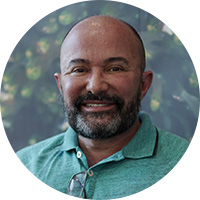 Dr. Gutemberg Sousa serves as Science and Technology Analyst at the National Technical Commission on Biosafety (CTNBio) and the Ministry of Science, Technology, and Innovation in Brazil. He is both a Biologist and Nutritionist, holding a Ph.D. in Biotechnology with a specialization in Sports and Clinical Nutrition.
Dr. Gutemberg Sousa serves as Science and Technology Analyst at the National Technical Commission on Biosafety (CTNBio) and the Ministry of Science, Technology, and Innovation in Brazil. He is both a Biologist and Nutritionist, holding a Ph.D. in Biotechnology with a specialization in Sports and Clinical Nutrition.
Mr. Facundo Simeone
Technical Specialist, Secretariat of Bioeconomy, Ministry of Economy, Argentina
 Mr. Facundo Simeone is currently a Technical Specialist at the Secretariat of Bioeconomy, Ministry of Economy, Argentina. A graduate in Political Science, Mr. Simeone has been serving since 2019 as the Adviser in charge of Policy Formulation and International Affairs for Biotechnology. In this role, he is deeply involved in developing the biosafety regulatory framework for products derived from modern biotechnology and coordinating Argentina’s national positions in cooperation with like-minded countries across major international forums. Mr. Simeone represents Argentina in several key platforms, including the Agricultural Biotechnology Commission of the SWG8 MERCOSUR, the Working Group on Public Policies in Agricultural Biotechnology of the Southern Agricultural Council, and various bilateral and multilateral meetings organized by entities such as the CBD, Cartagena Protocol, OECD, FAO, LMG, and IICA. He also played a crucial role in managing and negotiating the recent Agreement/Memorandum of Cooperation on the biosafety of modern biotechnology products between Argentina and Brazil. He contributed to the document titled “Evolution of the Use of Biotechnology in the Countries of the Southern Agricultural Council,” a comprehensive work on public policies in biotechnology from the Working Group (GT5) of the Agricultural Policy Network of the Consejo agropecuario del sur (CAS), published in 2022.
Mr. Facundo Simeone is currently a Technical Specialist at the Secretariat of Bioeconomy, Ministry of Economy, Argentina. A graduate in Political Science, Mr. Simeone has been serving since 2019 as the Adviser in charge of Policy Formulation and International Affairs for Biotechnology. In this role, he is deeply involved in developing the biosafety regulatory framework for products derived from modern biotechnology and coordinating Argentina’s national positions in cooperation with like-minded countries across major international forums. Mr. Simeone represents Argentina in several key platforms, including the Agricultural Biotechnology Commission of the SWG8 MERCOSUR, the Working Group on Public Policies in Agricultural Biotechnology of the Southern Agricultural Council, and various bilateral and multilateral meetings organized by entities such as the CBD, Cartagena Protocol, OECD, FAO, LMG, and IICA. He also played a crucial role in managing and negotiating the recent Agreement/Memorandum of Cooperation on the biosafety of modern biotechnology products between Argentina and Brazil. He contributed to the document titled “Evolution of the Use of Biotechnology in the Countries of the Southern Agricultural Council,” a comprehensive work on public policies in biotechnology from the Working Group (GT5) of the Agricultural Policy Network of the Consejo agropecuario del sur (CAS), published in 2022.
Dr. Germán Ceizel Borella
Regulatory Affairs Specialist – Agriculture, Secretariat of Bioeconomy, Ministry of Economy, Argentina
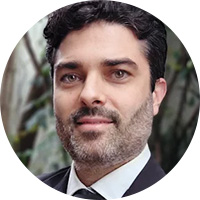 Dr. Germán Ceizel Borella is the Regulatory Affairs Specialist for Agriculture at the Secretariat of Bioeconomy, Ministry of Economy, Argentina. He earned his B.S. and Ph.D. in Biological Sciences from the University of Buenos Aires, where he specialized in soil microbiology, plant-bacteria interaction, and molecular biology. Since 2014, Dr. Borella has been instrumental in the environmental risk assessment (ERA) of genetically modified organisms (GMOs) within the Secretariat. He provides expert advice and technical support to the Undersecretariat of Bioindustries, Biotechnologies, and Innovation, and the National Advisory Committee on Agricultural Biotechnology (CONABIA), focusing particularly on microbial GMOs. Since 2017, Dr. Borella has led the Advisory Committee on Agricultural Bioinputs Usage (CABUA), which aims to advance the use of agricultural, agri-food, agro-industrial, and agro-energy bioinputs in Argentina
Dr. Germán Ceizel Borella is the Regulatory Affairs Specialist for Agriculture at the Secretariat of Bioeconomy, Ministry of Economy, Argentina. He earned his B.S. and Ph.D. in Biological Sciences from the University of Buenos Aires, where he specialized in soil microbiology, plant-bacteria interaction, and molecular biology. Since 2014, Dr. Borella has been instrumental in the environmental risk assessment (ERA) of genetically modified organisms (GMOs) within the Secretariat. He provides expert advice and technical support to the Undersecretariat of Bioindustries, Biotechnologies, and Innovation, and the National Advisory Committee on Agricultural Biotechnology (CONABIA), focusing particularly on microbial GMOs. Since 2017, Dr. Borella has led the Advisory Committee on Agricultural Bioinputs Usage (CABUA), which aims to advance the use of agricultural, agri-food, agro-industrial, and agro-energy bioinputs in Argentina
Dr. Bhavneet Bajaj
Manager – Scientific Programs, Agriculture & Food Systems Institute (AFSI), USA
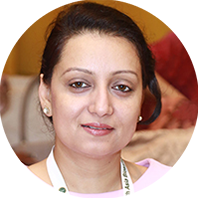 Dr. Bhavneet Bajaj joined the Agriculture & Food Systems Institute (AFSI) in July 2018 as Scientific Program Manager. She has been involved in projects related to safety assessment of foods and feeds derived from genetically engineered plants and serves as a resource person in providing technical support for capacity building programs in biotechnology. She was also the program lead for USDA-funded technical training for Chinese and Indonesian regulators and manages operations for both the Crop Composition Database and the World Nutrient Databases for Dietary Studies.
Dr. Bhavneet Bajaj joined the Agriculture & Food Systems Institute (AFSI) in July 2018 as Scientific Program Manager. She has been involved in projects related to safety assessment of foods and feeds derived from genetically engineered plants and serves as a resource person in providing technical support for capacity building programs in biotechnology. She was also the program lead for USDA-funded technical training for Chinese and Indonesian regulators and manages operations for both the Crop Composition Database and the World Nutrient Databases for Dietary Studies.
Prior to joining AFSI, Dr. Bajaj was a Visiting Scientist at the Sustainable Agricultural Systems Laboratory, Agricultural Research Service, USDA, where she worked on carotenoid pathway regulation in tomatoes. Before then, she was Associate Investigator with the Plant Protection group at (then) DuPont, where she devised a metabolic engineering strategy for insect control in soybean. While in India, she was an Assistant Professor at Jaipur National University, where she taught genetic engineering, enzymology, and biochemistry courses to M.Sc. level students. Her research work over the past 12 years involved plant secondary metabolites of nutritional, agricultural, and medicinal importance.
* AFSI is supported by a grant from the USDA FAS New Technologies and Production Methods Division.


